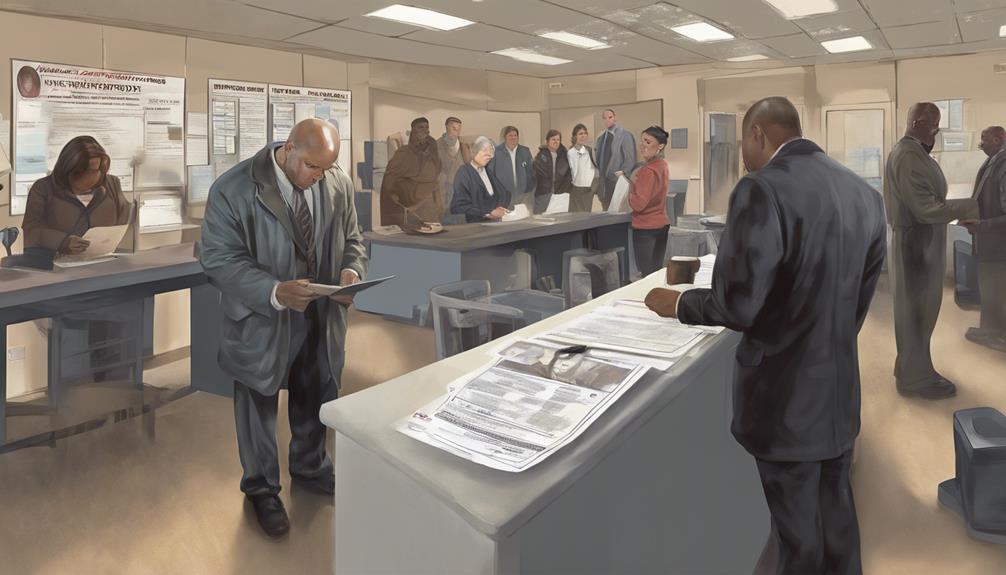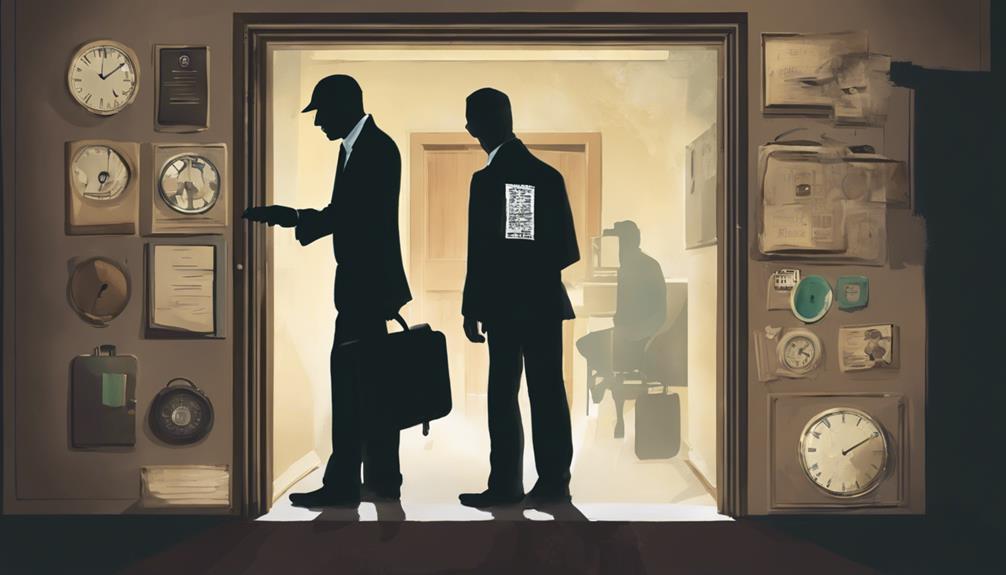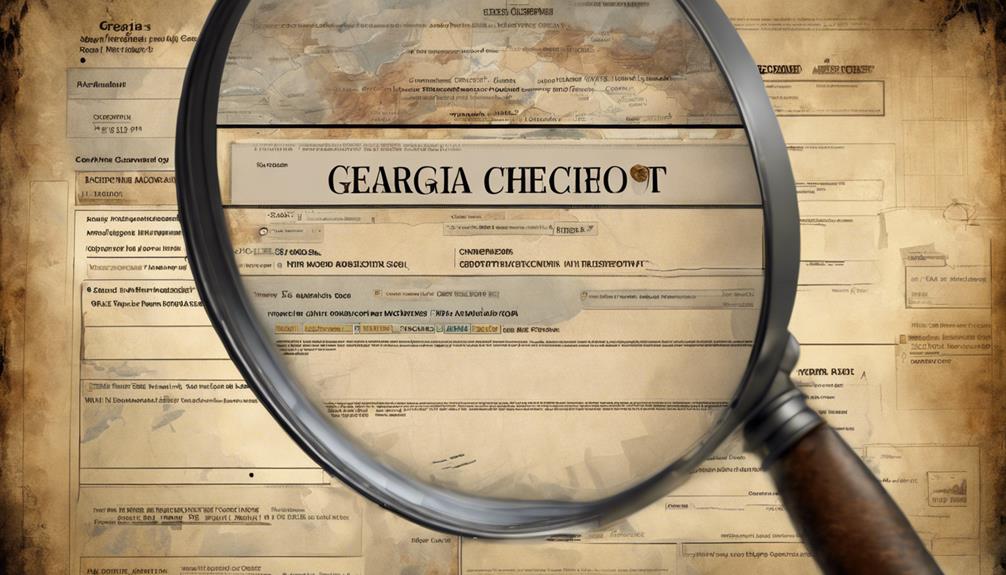Conducting free Illinois background checks offers essential insights into personal and professional backgrounds while staying compliant with state laws. Beneficial for verifying personal details, monitoring records, and ensuring accuracy, these checks can reveal criminal history, employment records, and education verification. Understanding Illinois laws like Ban the Box and the Fair Credit Reporting Act is important for legal hiring practices. The process involves verifying qualifications, conducting checks, and utilizing CRAs for efficient screenings. Lookback periods vary based on offense types, requiring adherence to FCRA regulations. County-specific resources can enhance the effectiveness of background checks. Understanding these aspects is key for thorough background investigations.
Key Takeaways
- Verify personal information accurately and securely.
- Understand Illinois background check laws and legal requirements.
- Comply with FCRA regulations and hiring practices implications.
- Follow screening process steps and essential elements.
- Consider county-specific resources for efficient background checks.
Benefits of Free Illinois Background Checks

Free Illinois background checks offer individuals a valuable opportunity to verify personal information and monitor their records for accuracy. Job seekers can benefit from these free checks by reviewing their own background information before applying for positions. These checks can provide insights into various aspects such as criminal records, employment history, and education verification.
By utilizing free Illinois background checks, individuals can identify any errors or inaccuracies in their records that could potentially impact their employment opportunities.
Moreover, these checks play an essential role in maintaining personal security. Ensuring that the information contained in one's background check is up to date and accurate is vital for safeguarding personal information. Free Illinois background checks serve as a proactive measure for individuals to stay informed about their background information and take necessary steps to rectify any discrepancies.
Ultimately, these checks empower individuals to have more control over their personal data and security.
Understanding Illinois Background Check Laws
Illinois background check laws encompass legal requirements, compliance with the FCRA, and implications for hiring practices. Employers must navigate Ban the Box laws, Executive Order 2013-1, and House Bill 5701 to guarantee fair hiring practices.
Understanding these regulations is essential for conducting thorough and compliant background checks in Illinois.
Illinois Legal Requirements
When conducting background checks in Illinois, employers must adhere to several legal requirements. This includes compliance with the Fair Credit Reporting Act (FCRA) and following Ban the Box laws.
Private sector employers in Illinois are subject to Ban the Box laws. These laws delay criminal history inquiries until after an interview or conditional offer.
Public sector employers, specifically the State of Illinois, are prohibited from making criminal history inquiries under Executive Order 2013-1.
The Illinois Uniform Conviction Information Act allows for the accessibility of conviction information to the public.
Additionally, the Illinois Employee Credit Privacy Act restricts the inclusion of credit history inquiries in pre-employment background checks, with exceptions for certain positions.
To ensure background checks compliance, employers in Illinois must navigate these various legal requirements governing criminal history inquiries, credit history checks, and the timing of background checks within the state's regulatory framework.
Compliance With FCRA
Employers conducting background checks in Illinois must guarantee compliance with the Fair Credit Reporting Act (FCRA) to uphold legal and fair hiring practices. Adhering to FCRA regulations is essential to ensure transparency and fairness in the background screening process. The FCRA mandates that candidates be informed and provide consent before background checks are conducted, emphasizing the importance of candidate privacy and rights. In Illinois, employers need to follow the FCRA adverse action process if a candidate is not hired due to information found in the background check. Consulting legal counsel or HR professionals can offer valuable guidance on navigating FCRA regulations, helping employers avoid legal pitfalls and maintain compliance. By prioritizing compliance with the FCRA, employers in Illinois can establish a foundation of trust with candidates and promote ethical hiring practices.
| Key Points | Details | Importance |
|---|---|---|
| FCRA Compliance | Ensures legal and fair hiring practices by following FCRA regulations. | Vital for maintaining transparency and fairness in background screenings. |
| Adverse Action Process | Necessary if a candidate is not hired based on background check information. | Helps protect candidate rights and ensures proper communication in hiring decisions. |
| Consulting Legal Counsel | Provides guidance on adhering to FCRA regulations in Illinois. | Helps employers navigate complex legal requirements and avoid potential liabilities. |
Hiring Practices Implications
Private sector businesses in Illinois must adhere to specific laws and regulations governing hiring practices related to background checks. Illinois employers are required to comply with Ban the Box laws and Executive Order 2013-1, which limit the timing of criminal history inquiries during the hiring process.
House Bill 5701 mandates that private sector employers in Illinois delay asking about an applicant's criminal history until after an interview or conditional job offer. Additionally, the Illinois Uniform Conviction Information Act provides public access to conviction records, influencing hiring practices in the state.
It's crucial for Illinois employers to follow the Fair Credit Reporting Act (FCRA) to ensure legal hiring practices when conducting background checks. Besides, the Illinois Employee Credit Privacy Act prohibits inquiries about an applicant's credit history in pre-employment screenings, except for certain positions.
Adhering to these laws and regulations is vital for Illinois employers to maintain compliance and promote fair and lawful hiring practices.
Illinois Background Check Process Explained

To understand the Illinois background check process, individuals must familiarize themselves with the various types of screenings available. When conducting an Illinois background check, comprehensive results can be obtained by including criminal background checks, employment verification, reference checks, education verification, and driving record checks. Certain positions in Illinois may necessitate fingerprint-based criminal background checks for enhanced security measures. Employers have the option to conduct these checks independently or collaborate with a Consumer Reporting Agency (CRA) like Checkr for efficient and accurate results. By partnering with a CRA, the background check process is streamlined, ensuring adherence to relevant laws and granting access to a wide array of detailed information.
| Types of Screenings | Description | Additional Information |
|---|---|---|
| Criminal Background Checks | Review of an individual's criminal history for any convictions or pending charges | May involve Illinois State Police |
| Employment Verification | Verification of an individual's work history and past employers | Ensures accuracy in employment claims |
| Reference Checks | Contacting provided references to verify character and performance | Offers insights from previous connections |
| Education Verification | Confirming academic qualifications, degrees earned, and educational institutions attended | Validates educational background |
| Driving Record Checks | Examination of an individual's driving history, including any violations or accidents on record | Relevant for roles involving driving duties |
Key Considerations for Illinois Background Checks
Employers in Illinois must make sure their background check process adheres to legal requirements to avoid potential liabilities. Understanding the screening steps and compliance overview is important when conducting thorough and reliable background checks.
Legal Compliance Overview
When conducting background checks in Illinois, employers must adhere to various legal requirements, including compliance with the Fair Credit Reporting Act (FCRA) and state-specific laws such as Ban the Box and the Illinois Employee Credit Privacy Act. Ensuring a thorough and accurate background check directly impacts the hiring process and promotes fair practices. Employers need to be qualified in handling criminal history information, keeping in mind the impact of lookback periods and the restrictions imposed by the FCRA.
| Legal Requirement | Description |
|---|---|
| Fair Credit Reporting Act (FCRA) | Regulates the collection and use of consumer credit information for employment purposes. |
| Ban the Box | Prohibits employers from inquiring about an applicant's criminal history on initial job applications. |
| Illinois Employee Credit Privacy Act | Prohibits employers from requesting or considering an applicant's credit history in hiring decisions. |
| Illinois Uniform Conviction Information Act | Provides guidelines for the dissemination of conviction information by law enforcement agencies. |
Screening Process Steps
The initial step in the screening process for Illinois background checks involves verifying candidate qualifications through various means, including education, employment history, and criminal records.
Employers in Illinois may conduct a range of screenings such as employment verification, reference checks, education verification, driving record checks, and drug testing to make well-informed hiring decisions.
For certain positions requiring higher security measures, fingerprint-based criminal background checks are essential.
To streamline the screening process and comply with laws, employers can opt to partner with a Consumer Reporting Agency (CRA) like Checkr.
By collaborating with a CRA, businesses gain access to thorough results, faster turnaround times, and an efficient screening process for potential employees.
This partnership can help employers in Illinois navigate the complexities of background checks while ensuring thoroughness and adherence to legal requirements.
Essential Elements of Illinois Background Checks

Commonly, Illinois background checks encompass various important elements, including criminal history, employment and education verification, and reference checks.
In some cases, positions in Illinois may require fingerprint-based criminal background checks to enhance security measures.
Adhering to Illinois laws, such as Ban the Box legislation and the Fair Credit Reporting Act (FCRA), is essential for employers conducting background checks.
It's necessary for employers in Illinois to ensure compliance with regulations governing permissible inquiries regarding arrest and conviction records when performing background checks.
Understanding the limitations, regulations, and components of Illinois background checks is crucial for employers to make well-informed hiring decisions.
Illinois Background Check Lookback Periods Overview
Employers in Illinois routinely consider the specific lookback periods for different types of background checks to guarantee compliance with relevant regulations. Illinois background check laws dictate that felony and misdemeanor convictions remain on record indefinitely unless expunged.
Juvenile records are sealed in Illinois, while specific driving offenses are recorded indefinitely. When conducting employment background checks, employers in Illinois must adhere to the Fair Credit Reporting Act (FCRA) regulations regarding background check timeframe.
The lookback periods for criminal history reviews during hiring in Illinois vary depending on the type of offense and applicable laws. Understanding these specific offense categories and their corresponding lookback periods is crucial for employers to make informed decisions during the hiring process while staying in line with Illinois background check regulations.
County Resources for Illinois Background Checks

Within Illinois, various counties offer valuable resources for conducting background checks efficiently and in compliance with local laws and regulations. Cook County, the most populous county in Illinois, has implemented Ban the Box laws to promote fair hiring practices among employers. DuPage County, known for its emphasis on technology and research industries, provides county-specific resources for background checks. Kane County, with its beautiful state parks and forest preserves, offers a scenic backdrop for residents and resources for conducting background checks. Lake County, an affluent area home to the US Naval Station Great Lakes, emphasizes community and provides valuable tools for employers in Illinois to ensure adherence with local regulations. By utilizing these county-specific resources, Illinois employers can navigate background checks effectively while following the laws and regulations in place.
| County | Key Features |
|---|---|
| Cook County | Ban the Box laws for fair hiring practices |
| DuPage County | Emphasis on technology and research industries |
| Kane County | Scenic state parks and forest preserves |
| Lake County | Home to US Naval Station Great Lakes |
Frequently Asked Questions
What Is the Best Background Check for Free?
The best background check for free may not provide reliable or detailed information. Employers should opt for reputable consumer reporting agencies for accurate and legally compliant checks. Free services may lack access to official databases.
What Is the Most Comprehensive Online Background Check?
Like a skilled detective unraveling a mystery, the most extensive online background check scours multiple databases for criminal records, employment and education verification, identity checks, and more. It offers a thorough and accurate investigation.
What Is the New Illinois Law for Background Checks?
The new Illinois law for background checks requires private sector employers to delay criminal history inquiries until after an interview or conditional offer. This law aims to prevent discrimination based on criminal history during the initial hiring stages.
How Much Does a Background Check Cost in Illinois?
Background check costs in Illinois can vary greatly, ranging from $20 to over $100. Employers may find package deals or subscription services to reduce costs. Quality and compliance should be prioritized when considering providers.
Conclusion
To sum up, conducting free Illinois background checks can provide valuable insights into an individual's history and help make informed decisions.
Remember, 'knowledge is power' when it comes to understanding someone's background and ensuring safety and trust in various settings.
Take advantage of the resources available and follow the proper procedures to conduct thorough background checks in Illinois.









